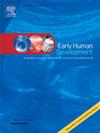COVID-19 pandemic and the neurodevelopment of Brazilian infants: Analysis of predictors according to the Nurturing Care Framework
IF 2.2
3区 医学
Q2 OBSTETRICS & GYNECOLOGY
引用次数: 0
Abstract
Introduction
Concerns have been raised about the potential negative impacts of the COVID-19 pandemic on child development; this issue can be analyzed using the Nurturing Care Framework (NCF).
Objective
To analyze the predictors of neurodevelopment at 12 months in infants born during the pandemic in Brazil, according to the NCF.
Methods
It is a longitudinal case-control study involving 284 infants born between April and August 2021. Mothers were interviewed at birth and at six months postpartum. At 12 months, the infants' neurodevelopment was assessed using the Bayley III Scale. The explanatory variables were grouped according to NCF components, and their association with Bayley III results was examined using hierarchical logistic regression, adjusting for socioeconomic status and gestational exposure to SARS-CoV-2.
Results
Twenty percent of the sample exhibited delays in at least one Bayley III domain (3% cognitive, 16 % language, and 7 % motor). We found an increased risk of cognitive (OR = 5.78; 95 % CI 1.07–31.09) and motor delays (OR = 6.97; 95 % CI 2.17–22.38) for children who had not undergone regular well-child care in their first six months. The likelihood of a child showing some delay at 12 months was 2.23 times higher when the mother reported concerns about the child's development at six months (95 % CI 1.11–4.50).
Conclusion
Well-child care emerged as a protective factor against cognitive and motor delays, while the mother's concerns were predictive of future developmental issues.
COVID-19 大流行与巴西婴儿的神经发育:根据 "养育关怀框架 "分析预测因素。
导言:COVID-19大流行对儿童发育的潜在负面影响引起了人们的关注;这一问题可通过 "养育关怀框架"(NCF)进行分析:根据 NCF,分析巴西大流行期间出生的婴儿 12 个月时神经发育的预测因素:这是一项纵向病例对照研究,涉及 2021 年 4 月至 8 月间出生的 284 名婴儿。母亲在婴儿出生时和产后六个月时接受了访谈。12 个月时,使用 Bayley III 量表评估婴儿的神经发育情况。根据NCF成分对解释变量进行了分组,并使用分层逻辑回归法研究了这些变量与Bayley III结果之间的关系,同时对社会经济状况和妊娠期感染SARS-CoV-2的情况进行了调整:20%的样本在至少一个 Bayley III 领域表现出发育迟缓(3%认知领域、16%语言领域和 7%运动领域)。我们发现,头六个月未定期接受儿童健康护理的儿童出现认知(OR = 5.78; 95 % CI 1.07-31.09)和运动迟缓(OR = 6.97; 95 % CI 2.17-22.38)的风险更高。如果母亲对孩子六个月时的发育情况表示担忧,那么孩子在 12 个月时出现某些发育迟缓的可能性要高出 2.23 倍(95 % CI 1.11-4.50):结论:良好的儿童保健是防止认知和运动发育迟缓的保护因素,而母亲的担忧则预示着未来的发育问题。
本文章由计算机程序翻译,如有差异,请以英文原文为准。
求助全文
约1分钟内获得全文
求助全文
来源期刊

Early human development
医学-妇产科学
CiteScore
4.40
自引率
4.00%
发文量
100
审稿时长
46 days
期刊介绍:
Established as an authoritative, highly cited voice on early human development, Early Human Development provides a unique opportunity for researchers and clinicians to bridge the communication gap between disciplines. Creating a forum for the productive exchange of ideas concerning early human growth and development, the journal publishes original research and clinical papers with particular emphasis on the continuum between fetal life and the perinatal period; aspects of postnatal growth influenced by early events; and the safeguarding of the quality of human survival.
The first comprehensive and interdisciplinary journal in this area of growing importance, Early Human Development offers pertinent contributions to the following subject areas:
Fetology; perinatology; pediatrics; growth and development; obstetrics; reproduction and fertility; epidemiology; behavioural sciences; nutrition and metabolism; teratology; neurology; brain biology; developmental psychology and screening.
 求助内容:
求助内容: 应助结果提醒方式:
应助结果提醒方式:


